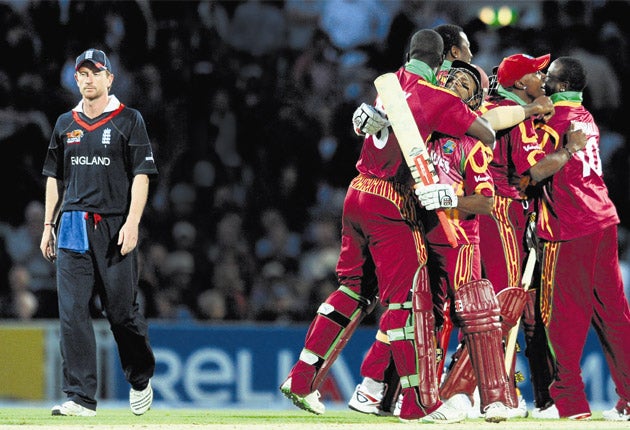So what did England learn in the World Twenty20?
Their tournament may be over, but Andy Flower's men can draw on key lessons for the future – and the Ashes campaign

What did England find out and has it improved their Ashes prospects?
To have taken their participation in the World Twenty20 to the final match of the second stage represented real progress for England. It may not look like it but this is to ignore the fact that they were generally deemed to be hopeless at the shortest form of the game before the tournament began.
Had England hoisted aloft the World Twenty20 Trophy at Lord's on Sunday it might have had repercussions up to the Ashes and beyond. The formats might be different but feel-good factors are endlessly transferable among sportsmen.
As it is, both England and Australia can start the Ashes knowing that the other is not much cop at Twenty20. On the first morning of the first Test at Sophia Gardens, Cardiff, three weeks today, it will have no bearing on anything.
But England should heed lessons for their Twenty20 future. The two substantial ones are concerned with fielding and middle-order batting. The fielding was not bad in the five matches England played, it simply was not good. Saving five to 10 runs can be decisive and England rarely saved them.
The middle order did not contain enough slugging nous. This is not to say that every ball has to be hit for six but urgency was infrequently imparted.
The bowling, however, generally held up (except in the opening match when too many bowlers were milked). Adil Rashid deserves a special mention because it was expecting far too much for a 21-year-old leg spinner who bowls far too many bad balls to come into international cricket in such circumstances. But he handled himself and his bowling well enough almost to justify his selection. England, however, would be well advised not to push their luck by picking him in the Ashes.
Who missed the chance to impress?
During the tournament it became fashionable to deride Luke Wright's abilities as opener and against the best fast bowling he might fail too often. But as lower middle-order blaster a la Albie Morkel of South Africa he may have something to offer.
Dimitri Mascarenhas was another whose reputation suffered and he performed none of the lower-order hitting of which he is capable.
Owais Shah was top scorer in the humiliation by South Africa but it was a poor tournament for him. He is still the best improviser of shots in the side but his fielding is a worry to all and he may not be around much longer.
Did England get their selection wrong?
Robert Key's abject form played a part in his being ignored but both he and Graham Napier may have suffered because the selectors on the ground took a view. Both men had been picked because they were T20 specialists – Napier accomplished enough, indeed, to have played in the Indian Premier League – but it was hard to avoid the conclusion that neither of the men picking the team, coach Andy Flower and captain Paul Collingwood, thought they were good enough.
In the case of Key, it always seemed odd that, one, he was not picked as captain since he had obviously performed the role well for Kent and odder, two, that he was not picked alongside his fellow Kent opener Joe Denly since the pair operate in T20 as a unit.
The batting order was clearly not fit for purpose and the team were dependent almost entirely on Kevin Pietersen and Ravi Bopara. The squad was poorly selected in the first place.
Was Collingwood a good choice as captain?
With Paul Collingwood you get what you see. No England cricketer of recent vintage has made greater use of his talents. He is a tough cricketer but that does not make him an innovative cricketer.
Too often in the field he was perplexed (as we knew he would be) and a shrewder captain might have been able to conjure up something against the Netherlands. He was willing to take advice (and had to take plenty of it from Kevin Pietersen).
He was all at sea against South Africa but then they had that effect on the whole team. It was a ridiculous state of affairs that, a month before the tournament started, the host nation's selectors were going cap in hand to a chap who had resigned the one-day captaincy a year earlier. But England were not eliminated early because of Collingwood's captaincy.
Did Foster prove the value of specialist 'keepers?
This is, of course, a silly query because the wicketkeeping debate, like the poor and taxes, will always be with us. It was with us when Les Ames was first preferred to George Duckworth, when Jim Parks kept out John Murray and Keith Andrew and even when Alan Knott forced Bob Taylor to wait his turn.
It is not going anywhere. That said, Foster was splendid. There is a school of curmudgeonly thought that in the old days there were always a dozen keepers in England as good as Foster. No, there were not. He has fast, soft hands, good balance and he keeps his fielders on their toes (which England need). He was a delight to watch, though he is not infallible.
The fact is, however, that Matt Prior is an authentic batsman and the selectors have to work out who can offer more in the scoreboard balance sheet. It remains an endlessly fascinating debate.
Is Twenty20 here for good?
Not half.
Ashes watch
21 days to go:
Mitchell Johnson has issued a warning to the England team, saying that he and the other Australian quick bowlers are swinging it both ways. Lucky them.
Join our commenting forum
Join thought-provoking conversations, follow other Independent readers and see their replies
Comments
Bookmark popover
Removed from bookmarks